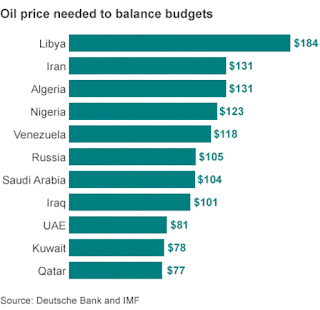Global oil prices have fallen sharply over the past eight
months, leading to significant revenue shortfalls in many oil exporting
nations, while consumers in many importing countries are likely to have to pay
less to heat their homes, drive their cars or run their energy houses.
From 2010 until mid-2014, global oil prices had been fairly
stable, at around $110 a barrel. But since June prices have more than halved.
Brent crude oil has now dipped below $50 a barrel for the first time since May
2009 and US crude is down to below $48 a barrel.
The reasons for the decline – China slowing down coupled
with US surging production & shale gas revolution, OPEC’s determination to
not to cut production and Iran edging towards entering global trade, black
market sales from Iraq & Syria which means additional supplies.
So who are the
WINNERS?
Mainly those countries that need to import oil. Within Asia,
China, India, South Korea, Japan and Thailand have been the gainers. The
benefits, cutting them short, lower inflation, lower business costs, improved
purchasing power, correction of balance of payment and cut in interest rates!
Cheaper oil translates into lower inflation. Oil is used as
a raw material in various industries such as petrochemicals, fertilizers and
etc. As oil prices decline, the logistics become more economical and hence consumers
will have to pay less. This will also make these products more internationally
competitive. However, most of the agro economies in Asia continue to rely on
imports of both petrochemicals and fertilizers due to increasing demands,
unusual weather patterns and logistic issues due to poor infrastructure.
Both India and Indonesia have taken the opportunity to cut
energy subsidies and raise taxes on energy. India imports 75% of its oil, and
analysts say falling oil prices will ease its current account deficit. At the
same time, the cost of India's fuel subsidies could fall by $2.5bn this year - assuming
oil prices stay low.
Consumer inflation has hit a 5-year low in China. However,
lower oil prices won't fully offset the far wider effects of a slowing economy.
Who has lost and why?
Most of the big oil producers like Malaysia and western
Asian countries. For Malaysia energy exports account for 20% of the national
economy, so cheaper oil is a problem.
Saudi Arabia, the world largest and the most influential oil
exporter, needs oil prices around $85 in the long run, but seems less
interested to cut down supplies in order to pressurize the US shale gas
industry and it can afford to continue this way for long as the country sits on
a reserve fund close to $700 billion. Gulf producers such as the United Arab
Emirates and Kuwait have also amassed a considerable foreign currency reserve,
which means that they could run deficits for several years if necessary.
Europe is an interesting case here. A lot of analysts
believe that Europe in general will benefit from the collapse in oil prices but
its exposure to Russia jeopardizes the benefit realization. A recession in
Russia and depreciation of the Russian Ruble will reduce investments in Moldova,
Armenia, Belarus and all those European states which are vulnerable to
dislocations in the Russian labor market because of the reliance on
remittances from Russia. Plus most of
these countries import oil to process into other products such as
petrochemicals and fertilizers, for which oil accounts for major portion of the
cost. A decline in oil prices means fall in prices of these commodities too.

